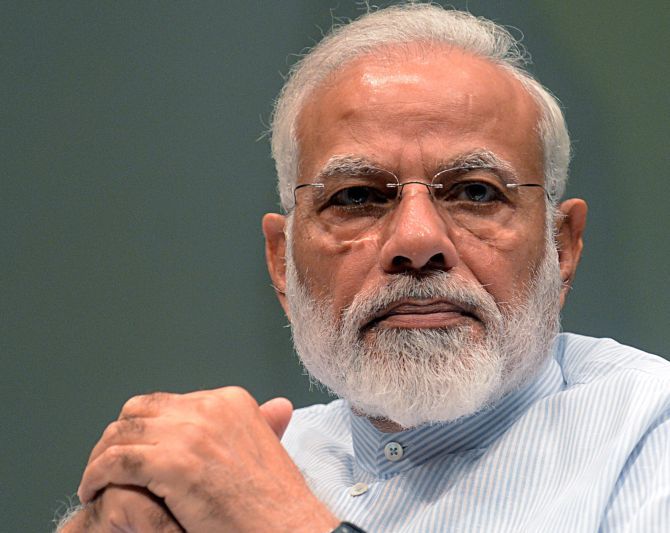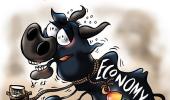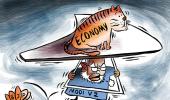'The Modi regime is not willing to use its huge political capital for taking any economic policy measure that it fears might undermine that political strength, says A K Bhattacharya.

Three broad contradictory trends have marked the government’s management of the Indian economy in recent months.
The contradictions have made the policy challenge to overcome the current economic slowdown even more formidable.
How soon the Modi government can resolve these contradictions is difficult to say, but their early recognition at least will perhaps be the first step towards a resolution.
The first contradiction stems from the Centre’s stressed finances.
The headline number for the government’s fiscal deficit does not tell the entire story. Yes, the fiscal deficit in 2018-19 was 3.4 per cent of the gross domestic product (GDP) and is projected to be 3.3 per cent in 2019-20. But these figures mask the real stress in the government’s finances.
With a substantial amount of off-Budget borrowing and slowing tax collections, the actual gap in the government’s revenues and expenditure is much higher than what the headline number of the fiscal deficit indicates.
Yet, the government has gone into overdrive with its welfarism. Such a direction means that the government has to provide for more resources from the exchequer to finance a host of welfare schemes.
If it is the piped water supply scheme for all in the latest Budget, then the interim Budget in February this year talked about the scheme for income transfer to farmers.
A year ago, there was a massive scheme for health insurance for over half of India’s total population.
Add to these the many other welfare schemes like subsidised gas connection for the poor, affordable housing and the rural employment guarantee scheme that was started by the Manmohan Singh government, it becomes clear why the fiscal burden on the Centre’s finances has been rising at a disconcerting pace.
Ideally, welfare schemes should not be questioned. But when the government’s finances are under stress, the contradiction between the growing burden of welfarism and the government’s tight fiscal situation becomes acute.
In short, the Modi regime wants that the government should play a bigger role, but it does not have the comfort, let alone the luxury, of having enough financial resources with the exchequer.
The consequences are evident in the way tax collection departments of the government have become overactive, with complaints of harassment of corporate taxpayers rising.
Tax collection targets have been set at levels that are ambitious and unrealistic, not recognising the slowing growth trend in the economy and, therefore, in tax collections.
At another level, the government has also begun exploring options of sequestering a part of government revenues in a way that these do not have to be shared with the states.
The growing incidence of surcharge and cess on taxes, which are not shared with the states, and exploring a separate mechanism for funding defence and internal security to ensure an assured allocation of finances for them are among such disturbing trends.
The second contradiction arises out of the Modi government’s political stance.
The results of the general elections in 2019 showed that the Modi government has grown its political capital by a huge margin.
Not only has it won more seats in the Lok Sabha, but it has vanquished the opposition political parties in almost all the states, barring a few in southern India. It faces very little opposition in getting virtually any legislative bill passed by Parliament.
But the irony is that the Modi regime is not willing to use its huge political capital for taking any economic policy measure that it fears might undermine that political strength.
It appears to be reluctant to initiate any economic policy move that might show the government to be favouring the big business, as this can upset its voters base, composed of the ordinary middle class and the poor people.
Thus, taxes are raised on the rich and the reports of committees that recommend a more friendly or lower taxation system for India Inc do not see the light of day.
The third contradiction is seen in the manner in which it has tried to revive investment.
Recognising that the government or the Indian private sector is facing a resources crunch, it is increasingly relying on foreign inflows to fuel an investment drive in the country.
But there is no simultaneous attempt to promote exports to prevent any adverse impact such foreign inflows can have on the country’s balance of payments.
And instead of fixing the flawed exchange rate policy to eliminate the negative fallout of an overvalued currency on exports, the government appears to have embarked on a path of import substitution, a signal of which is evident from the manner in which import duties have been raised successively in the last couple of Budgets.
The short point is unless these contradictions are resolved over the next few months, there is very little chance of the government coming to grips with the challenges of an economic slowdown.











 © 2025
© 2025